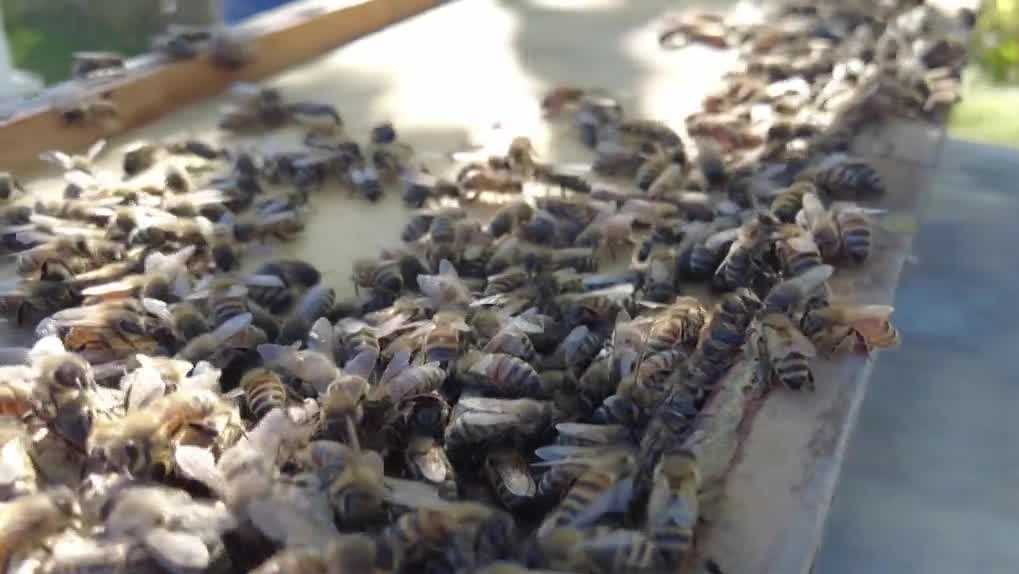Beekeepers fight to save America’s bees amid growing colony collapse

By Pete Cuddihy
Click here for updates on this story
OMAHA, Nebraska (KETV) — Honey bees across America are facing a crisis that threatens their very existence.
Research from the University of Nebraska-Lincoln shows that Nebraska is among the hardest-hit states, losing as many as 70 to 80% of bee colonies in the past year.
“Bees are really important if you like a diverse diet,” said local beekeeper Mark Welsch.
Welsch began beekeeping nearly 50 years ago and has firsthand experience dealing with the challenges that come with colony collapse.
“Bees are not thriving like they used to,” he said.
While “colony collapse” may sound like every bee is dying, the issue is far more complex. Curious to learn more, I visited the University of Nebraska-Lincoln.
“Colony collapse is not necessarily where the colonies are completely dead,” explained entomologist Judy Wu-Smart of the University of Nebraska-Lincoln. “But they have completely depopulated in terms of the workforce and are no longer functional.”
Wu-Smart, who educates beekeepers across the Midwest, said there are multiple threats to bee colonies. One of the biggest is the Varroa destructor mite.
“This is a mite that is an active, parasitic kind of pest that rides around on the bee, feeds on them, and removes and depletes some of their fat bodies,” Wu-Smart said.
To put it into perspective, if a human were the size of a bumblebee, the mite would be about the size of a dinner plate. These mites also transmit viruses that spread throughout a colony, eventually killing all of the bees.
“The real solution to Varroa mites is just selecting hives that take care of them naturally,” said Welsch.
That solution led me to Mike Wrobel, president of the Omaha Beekeepers Club, who is working to breed bees that can resist mites.
“What you really need are unique queens that are resistant to the mites to begin with,” said Wrobel.
Wrobel calls these “quality queen bees.” They carry genes that make them sensitive to mites and capable of removing them from the hive.
“They’re able to smell the fact that the mite has just started to reproduce,” Wrobel explained.
But creating these quality queens isn’t easy.
“I can select the male bees and harvest their semen, then instrumentally inseminate the queen to make sure I’m getting the right genetics on both the male and female sides,” he said.
To control remaining mites, Wrobel treats his hives with oxalic acid gas.
“It’s enough to kill the mites, but not enough to kill the bees,” he added.
While these solutions help keep mites in check, Wu-Smart warns that they are only one piece of the puzzle. Pesticides are also a major threat.
“They can cause erratic changes in behavior that ultimately cause a colony to decline,” she said.
Those behavioral changes can affect even the most resilient bees.
“One of the solutions is breeding for stronger, more resilient bees — and he’s doing that,” Wu-Smart said. “But all his efforts will be at a loss if we can’t control pesticide exposure and improve the availability of forage.”
Another obstacle is the lack of plant diversity in the landscape, making it difficult for bees to get the nutrients they need to fight disease.
“All they have is corn and soybeans, and it’s just not nutritious enough for them,” Welsch said.
While the situation may seem bleak, there is still hope.
“I’m very hopeful for the future. I think there is public interest, and there’s definitely a need,” Wu-Smart said.
One small step anyone can take is adding more diverse plants to their yard. “If everybody — like a lot of my neighbors — had flowering plants in their yards, it would be much easier for the bees,” Welsch noted.
Another important action is making sure state leaders understand the urgency of the issue. “The first step is to recognize that we have a beekeeping industry in need of help — both with disease diagnostics and with landscape support,” Wu-Smart said.
There’s still time to act, but saving the bees will take effort from everyone.
Please note: This content carries a strict local market embargo. If you share the same market as the contributor of this article, you may not use it on any platform.